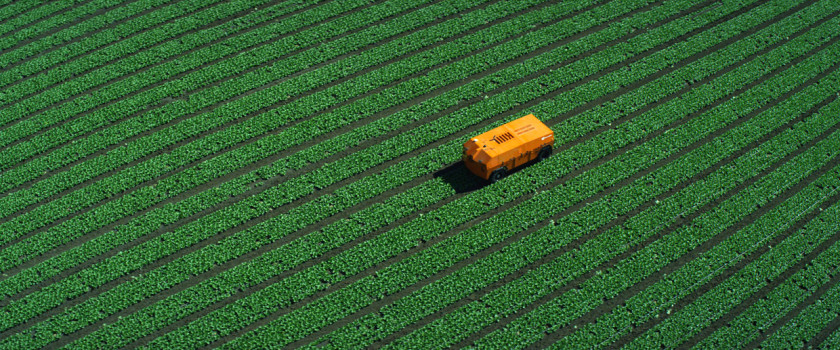FarmWise robots, powered by artificial intelligence, autonomously move through crops in search of weeds. At first glance, the crops appear to be no different from other crops that cover California's Salinas Valley, often referred to as the "American salad bowl." All you see in the photo are rows of lettuce, broccoli and cauliflower stretching out to the horizon. Large orange robots follow. They look for and destroy weeds. Equipped with tractor-like wheels, multiple cameras and environmental sensors, they autonomously move up and down the beds, hunting any "green invaders". Instead of spraying herbicides and pesticides, a retractable hoe is used, which kills weeds quickly and accurately.
The robots are owned by FarmWise, a San Francisco-based startup that wants to use robotics and artificial intelligence to make farming healthier and more delicious. In a recent round of financing, the company raised $ 14.5 million. USA, and in 2020 it plans to deploy its first commercial robot park with more than 10 machines serving farmers in the Salinas Valley.
FarmWise says that while its robots are currently optimized for weeding, future developments will do much more. “Our goal is to be a one-stop agriculture platform,” says co-founder and CEO Sebastien Boyer. "We want to automate almost everything from planting to harvesting."
Robots collect vast amounts of data, including detailed images of plants and parameters that affect their health, such as temperature, moisture and soil conditions. But it is precisely what the robots will do with the information they receive that makes them truly unique. Using machine learning, they identify each plant, determine if it thrives, and if not, then do whatever it takes. Thanks to these AI robots, every broccoli stalk will have everything it needs to be the best broccoli.
Automation is not new to agriculture. Wheeled harvesters are becoming more autonomous, and farmers have long been "flying" in unmanned aerial vehicles to observe their crops from above. Also in development are robots designed to fully automate the collection of fruits and vegetables - apples, peppers, strawberries, tomatoes, grapes, cucumbers, asparagus. More recently, a number of robotics companies have turned their attention to ways to improve the quality or yield of crops.
Agricultural robots are still "a very nascent market," says Rian Whitton, senior analyst at ABI Research in London, but it "will grow significantly over the next 10 years." ABI predicts that annual shipments of mobile agricultural robots will exceed 100,000 units worldwide by 2030, 100 times the volume deployed today. This is still a small number compared to the millions of tractors and other agricultural machinery sold each year, but Whitton notes that demand for automation is likely to increase due to labor shortages in many parts of the world.
FarmWise says it works closely with farmers to understand their needs and develop robots based on their feedback. So how do they work? Boyer is not prepared to reveal details about the company's technology, but says the machines work in three stages.
First, an array of sensors collects images and other relevant crop data and stores this information on both on-board computers and cloud servers. The second step is the decision-making process, in which specialized deep learning algorithms analyze the data. There is an algorithm trained to detect plants in an image, and robots combine this output with GPS and other location data to accurately identify each plant. Another algorithm is trained to decide if the plant is, say, lettuce or weed. The last step is a physical action that the machines perform, such as deploying a hoe for weeding.
Robots complete these three steps in less than a second. Indeed, they can drive through fields, clearing the ground, at a pace that humans cannot reach. FarmWise reports that its robots have removed weeds from over 10 million plants to date. Whitton, an ABI analyst, says focusing on weeding as an initial application makes sense. “There is the potential to save billions of dollars from less pesticide use,” he says. But he adds that commercial success for agricultural automation startups will depend on whether they can expand their services to complement additional agricultural tasks, as well as operate in different regions and climates.
FarmWise already has a growing number of competitors. Deepfield Robotics, a subsidiary of the German conglomerate Bosch, has been testing an autonomous vehicle since 2015 that kills weeds by driving them into the ground. Australian startup Agerris is developing mobile robots for monitoring and spraying crops. And Sunnyvale, Calif., Founded by Blue River Technology, acquired by John Deere in 2017, creates robots for weeding large field crops such as cotton and soybeans.
So soon, farms all over the place will be filled with robots, and they will grow some of the best broccoli you will ever taste.
Source - https://spectrum.ieee.org
Sing in
Log in to shop, track orders, and enjoy personalized discounts and bonuses. Once registered as a legal entity, you can create your company page.

